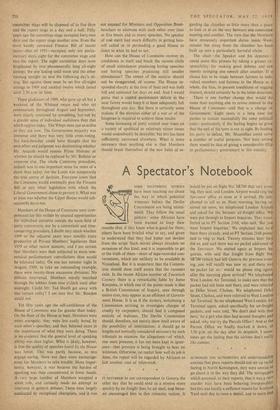A Spectator's Notebook
SOME DISTURBING STORIES
have been reaching me about the way in which potential witnesses before the Devlin Commission are being intimi- dated. They follow the usual pattern : some Africans have been warned to keep their mouths shut, if they know what is good for them; others have been briefed what to say, and given to understand that they had better not deviate from the script. Such stories always circulate on occasions of this kind; and it is impossible to get at the truth of them—short of tape-recorded con- versations, which are unlikely to be available in Nyasaland. But it is important that the Commis- sion should show itself aware that the rumours exist. In the recent African number of Twentieth Century there is a remarkable fable by Jomo Kenyatta, in which one of the points made is that a British Commission of Inquiry, seen through native eyes, may appear as an offshoot of Govern- ment House. It is as if the oysters, welcoming a Commission arriving to investigate charges of cruelty by carpenters, should find it composed entirely of walruses. The Devlin Commission should, therefore, not merely show itself aware of the possibility of intimidation; it should go to lengths not normally considered necessary by such tribunals to examine the allegations—of which, one must presume, it has not been kept in ignor- ance—that pressure is being brought to bear on witnesses. Otherwise, no matter how well its job is done, the report will be regarded by Africans as just another coat of whitewash.






































 Previous page
Previous page